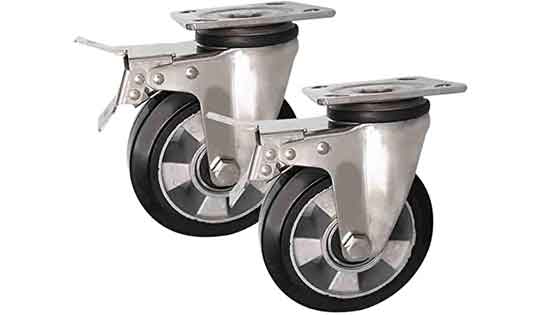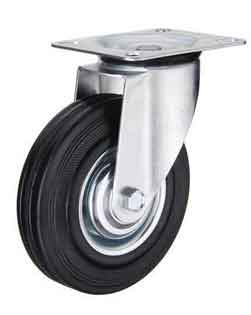Rubber casters or wheels are used widely in variety of applications, starting from small objects to heavy vehicles, including planes. A caster, also spelled as castor, is a type of wheel which is mounted with an offset steering pivot such that the wheel will automatically swivel or move to align itself to the direction from which it is pushed. The inside of the caster or wheel is usually made of plastic or metal with the outside made of rubber. Rubber caster wheels have a special compound of highly resilient soft rubber bonded to thick aluminum or steel or plastic wheel centers. These are highly resistant to most chemicals and are considered to be excellent for all floor surfaces. Small sized wheels or casters are usually rust-proof, quiet and easy rolling and are shock absorbing.
Types of rubber used in wheels or casters- Soft Rubber Wheels: These are used mainly for light loads, load capacities ranging from 80 to 350 lbs. They have a soft rubber tread with a hard core for quiet movement, smooth ride and excellent floor protection.
- Hard Rubber Wheels: These are used mainly for higher load capacities, ranging from 150 to 275 lbs. These wheels offer good floor protection and easier mobility. They also have a high resistance to mild acid, oil or grease.
- Moldon Rubber Wheels: They are used in very heavy load requirements, between 280 and 2,000 lbs.
- Economy
- Abusive applications
- Quiet and easy rolling
- Shock and vibration absorption
- Use in moist and wet environments
- Rejects floor debris
- Floor protection
- Wheel Chairs
- Trolleys
- Shopping Carts
- Platform Trucks
- Food Service Equipment
- Hotel Equipment
- Small Waste Bins
- Textile Carts
- Rolling Chairs
- Dolly
- Heavy duty swivel and rigid casters for powered industrial equipments
- Casters for pallet jacks and forklifts etc.


Buying Tips for rubber casters or wheels
The following are the most important specifications to consider:
- Load Weight: The wheel diameter depends on the laod. The heavier the load, the larger should be the wheel diameter. The weight influences the rollability.
- Floor Conditions: You should know your floor protection. Your wheel must be large enough to resist unique floor conditions, like cracks in the floor or tracks, moldings.
- Unusual Conditions: Be sure to consider unusual environmental conditions like moisture, extreme heat or cold, chemicals, blood, fats, oils, salt exposure etc. before selecting wheels or casters.
- Rollability: This is the ease with which caster and wheel is rolled.
- Swivel Radius: This is the measured horizontal distance from the vertical center line to the outside edge of the wheel tread. The larger the swivel radius, the easier the caster or wheel will rotate.
- Extreme Temperatures: Extreme heat or cold affects the performance of the caster and wheel.
- Anti Vibration Mountings
- Automobile Rubber Products
- Calendered Rubber Products
- Extruded Rubber Products
- Medical Rubber Products
- Metal Bonded Components
- Rubber Adhesives & Sealants
- Rubber Ball
- Rubber Bands
- Rubber Beading
- Rubber Bearing
- Rubber Belt
- Rubber Buckets
- Rubber Bullets
- Rubber Cable
- Rubber Coating
- Rubber Duct
- Rubber Expansion Joints
- Rubber Flooring/Matting
- Rubber Footwear
- Rubber Gloves
- Rubber Injection Parts
- Rubber Lining
- Rubber Magnets
- Rubber Molded Products
- Rubber Pads
- Rubber Rollers
- Rubber Stopper
- Rubber Suit
- Rubber Track
- Rubber Valve
- Rubber Balloon
- Rubber Stamps
- Rubber Fenders
- Acrylic Rubber (ACM)
- Butadiene Rubber (BR)
- Butyl Rubber (IIR)
- Chlorosulfonated Polyethylene(CSM)/ Hypalon
- Ethylene Propylene Diene Monomer
- Fluoroelastomers (FKM)/Viton
- Isoprene Rubber (IR)
- Nitrile Rubber (NBR)
- Perfluoroelastomer (FFKM)
- Polychloroprene (CR)/Neoprene
- Polysulfide Rubber (PSR)
- Silicone Rubber (SiR)
- Styrene Butadiene Rubber
How to Make a Custom Rubber Stamp?
Whenever designing a custom stamp for your company, never compromise on its quality because in the end it is the most...
Read MoreLatex and Silicone Rubber Tubing - A Comparison!
Many industries use rubber tubing for various purposes. In fact, various types of rubber tubing are used for different applications...
Read MoreSilicone vs Acrylic Adhesive- A Comparison
Silicon and acrylic adhesives are those rubber adhesives that are widely used in Polyimide tapes. In fact, the polyimide...
Read More

